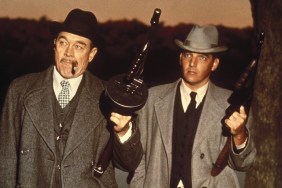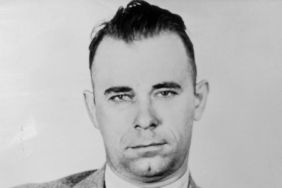Cast:
Johnny Depp as John Dillinger
Christian Bale as Melvin Purvis
Marion Cotillard as Billie Frechette
Billy Crudup as J. Edgar Hoover
Jason Clarke as John ‘Red’ Hamilton
Stephen Graham as Baby Face Nelson
David Wenham as Harry ‘Pete’ Pierpont
James Russo as Walter Dietrich
Stephen Dorff as Homer Van Meter
Christian Stolte as Charles Makley
Carey Mulligan as Carol Slayman
Emilie de Ravin as Barbara Patzke
Channing Tatum as Pretty Boy Floyd
John Ortiz as Phil D’Andrea
Giovanni Ribisi as Alvin Karpis
Leelee Sobieski as Polly Hamilton
Richard Short as Agent Sam Cowley
Randy Ryan as Agent Julius Rice
Shawn Hatosy as Agent John Madala
Kurt Naebig as Agent William Rorer
John Hoogenakker as Agent Hugh Clegg
Adam Mucci as Agent Harold Reinecke
Rebecca Spence as Doris Rogers
Don Harvey as Customer at Steuben Club
Shanyn Leigh as Helen Gillis (as Shanyn Belle Leigh)
Michael Vieau as Ed Shouse
John Kishline as Guard Dainard
Wesley Walker as Jim Leslie
John Scherp as Earl Adams
Elena Kenney as Viola Norris
Rory Cochrane as Agent Carter Baum
Madison Dirks as Agent Warren Barton
Lili Taylor as Sheriff Lillian Holley
Alan Wilder as Robert Estill
Directed by Michael Mann
Summary:
As technically flawless a film as we’ve come to expect from a master filmmaker like Michael Mann, but handled far more clinically than some might expect considering the subject matter and the summer release.
Story:
As John Dillinger (Johnny Depp), Baby Face Nelson (Stephen Graham) and their gang run rampant through the banks of the Midwest, J. Edgar Hoover (Billy Crudup) assigns the top agent in his newly-formed FBI, Melvin Purvis (Christian bale), to lead the war on crime against the brazen criminals. In the meantime, Dillinger has fallen in love with the feisty Billie Frechette (Marion Cotillard) and has sworn to protect her even if it puts his own life in danger.
Analysis:
The perceptions and expectations that accompany every new movie from filmmaker Michael Mann sometimes overshadow the results, but having the chance to see one of America’s finest crime filmmakers explore an era of crime that created legendary anti-heroes whose names are synonymous with bank robbery is an opportunity fans of his earlier work shouldn’t miss.
“Public Enemies” tells a later chapter in the story of the bank robbers who terrorized the Midwest during the Great Depression and how J. Edgar Hoover (played brilliantly by Billy Crudup) decided to use his new government agency, the FBI, to set an example by putting a stop them by whatever means necessary. Assigned to this mission is Hoover’s top man Melvin Purvis, played with steely resolve by Christian Bale, who is ready to do whatever it takes to catch John Dillinger (Johnny Depp) once he’s labeled the country’s “public enemy #1.” Meanwhile, Dillinger has become smitten with Billie Frechette (Marion Cotillard), a coach check girl who doesn’t seem phased by his chosen profession.
“Public Enemies” has more than a few things in common with some of Mann’s best previous work – the bank robberies and gunfights will certainly thrill fans of “Heat” as Mann solidifies his reputation as the “King of the Film Shootout.” That said, having some perspective will go a long way towards being able to appreciate and enjoy the resulting film. Being based on a non-fiction novel, it owes more to “Seabiscuit” or “Zodiac” than Mann’s past films, as he tries to create a historically-accurate portrayal of the times by compiling and filtering diverging accounts of events depicted to create the definitive take on the story. The results are a far more subdued affair than a summer popcorn movie like “The Untouchables” or fictionalized films set in Chicago’s gangland setting such as the Coens’ “Miller’s Crossing” or “Road to Perdition.” Instead, it tackles the crime genre similarly to how “The Assassination of Jesse James” handled the old West, resulting in a strategically-paced film steeped with a vast amount of research to insure every aspect of the story feels true, rather than playing the artistic license card to make a more Hollywood-friendly film.
The amazing cast Mann has assembled more than makes up for the slow pace, beginning and ending with Mr. Johnny Depp, who is absolutely mesmerizing as Dillinger, the charisma and charm he exudes in every scene being palpable. Who knows if the legendary criminal was anything like the way he’s portrayed by Depp, but there aren’t many actors more suited to winning the audience over while enacting the exploits of a brazen anti-hero who became like a Robin Hood to the downtrodden masses of the era. By comparison, Bale is somewhat stiffer in his role as G-man Purvis, though that may have been necessary for the character’s tenacious nature, never giving up or visibly showing frustration at the obstacles thrown in his path. It might have been nice to learn more about Purvis’ background in order to understand this personality better. Instead, Mann chooses to focus on Dillinger’s romance with Billie, which plays a large part in his own motivations. In that sense, Marion Cotillard proves her Oscar win for “La Vie en Rose” was no fluke, as her scenes with Depp are captivating, and she has more than a few memorable scenes on her own.
The writing might not pop as much as that of Mann’s previous work, but the overall cast goes a long way to making it work, filling every frame with diverse characters on both sides of the war on crime. Wisely, Mann remains tightly focused on the three principal characters, but you’ll probably leave the movie wanting to know more about many of these equally fascinating satellite characters. For instance, the meaty scenes of Stephen Graham (from Shane Meadows’ “This is England”) as Baby Face Nelson that makes one think there are other spin-off movies that can be culled from the source material.
Some have expressed issues with the look of the film due to Mann’s decision to use the latest digital HD technology to film a period piece. Even so, this is clearly the best-looking film of the year, the image on screen being crystal clear down to the most minute detail, to the point where you can almost see every pore on the actors’ faces. It makes perfect sense that a director with such an impeccable attention to detail would want to use a media that captures all of that detail, and it give the film a very distinct look from previous films set in the era. Some may be bothered by Mann’s decision to forsake the deliberately stylized filmmaking that usually accompanies period pieces set in this era in favor of realism but you can’t fault him for it, because every shot is framed so perfectly.
Mann’s attempt at remaining historically accurate is somewhat self-defeating in his attempts to create suspense or tension, because anyone even remotely familiar with Dillinger’s story will know the outcome of some of the key scenes. That doesn’t stop the film from being a fascinating study of the times as well as a textbook example on the technical aspects of filmmaking.
The Bottom Line:
“Public Enemies” may not be Michael Mann’s most immediate film due to the clinical way he handles a defining moment in the early days of the FBI using modern filmmaking techniques, but Mann’s intentions to be true to the source material are solid, as are the fantastic performances he gets from the entire cast. Due to the film’s summer release, some might go in expecting something far more exciting or action-packed, but Mann makes it more about the characters and their story, making for a far more satisfying piece of filmmaking.










